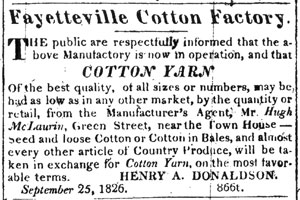North
Carolina
Business
History
Henry Donaldson (1782 - early 1870s)
A merchant and builder/owner of some of the second and third textile mills in North Carolina, Henry Donaldson apparently settled in the Edenton district around 1805, working as a merchant with David McDonald.




In 1812, Donaldson is listed as clerk of the Chowan County Court.
Around 1816, Donaldson began buying land around the Falls of Tar River in Edgecombe County, North Carolina, along with Joel Battle, Peter Evans and John Hogun. Hogun sold his shares to Battle in 1817 as a stone mill — the second textile mill in the state — was being constructed.
By 1820, the textile mill — later to be known as Battle's Mill, or the Rocky Mount Mills — was in operation. However, dissension among the partners caused Donaldson to buy out Evans' share in 1821. Later, one source reports that Donaldson sold his shares to Joel Battle in 1828.
While the Edgecombe mill was building its operations, Henry A. Donaldson next designed and co-owned a cotton mill in Fayetteville, NC, with George McNeill. As was typical with many early operations, the construction and operations were phased in over a period of time.
The factory (referred to the November 1824 ad at right) was in some limited operation in late 1824. As was common in those days, production often began on some basis, even before the mill was completed. Selling through local merchant Hugh McLaurin, the factory was referred to by different names — the Donaldson Factory, the Donaldson & McNeill Factory, the Fayetteville Cotton Factory and then the Fayetteville Manufacturing Company.
By June 1826, the three-story, frame factory had been completed with up to 1,200 spindles operating. The firm employed 20 to 50 people. The mill was located on Cross Creek.
Henry A. Donaldson was the chief promoter of the Fayetteville Manufacturing Company, incorporated by the General Assembly of 1828-29 on January 7, 1829.
But by 1830, Donaldson had moved from Fayetteville and was living in Wake Forest Township in Wake County. Mounting financial problems led him to sell his estate and move his family to Mobile, Alabama, around 1835. Reportedly, Donaldson had traveled to Alabama in 1833 to try to establish another textile mill. Additional research is needed to confirm this allegation.
In Alabama, Donaldson went to work for the State Bank in its Mobile branch — by at least April 1841 (letter to Calvin Jones). He also planted a scuppernong vineyard.
He worked as a note clerk and note teller for that state's bank. Apparently, he continued as a bank clerk into the early 1840s. In 1850, he listed $5,000 in personal property and real estate. From 1856 to 1859, Donaldson served as city treasurer for Mobile, Alabama, according to city directories.
By 1860, Donaldson is listed as secretary for a railroad.
By 1870, Donaldson had relocated to Jefferson, Texas, living with his daughter and son-in-law. He died there in the 1870s.

from the Fayetteville Observer

from the Fayetteville Observer

Oakwood Cemetery, Jefferson, Texas
Industries
Laureates Contact
Us Home
2006 Copyright. CommunicationSolutions/ISI for web site and content.